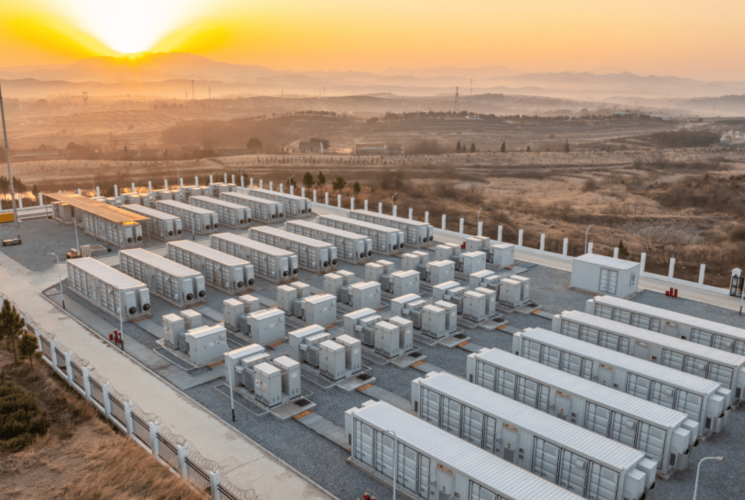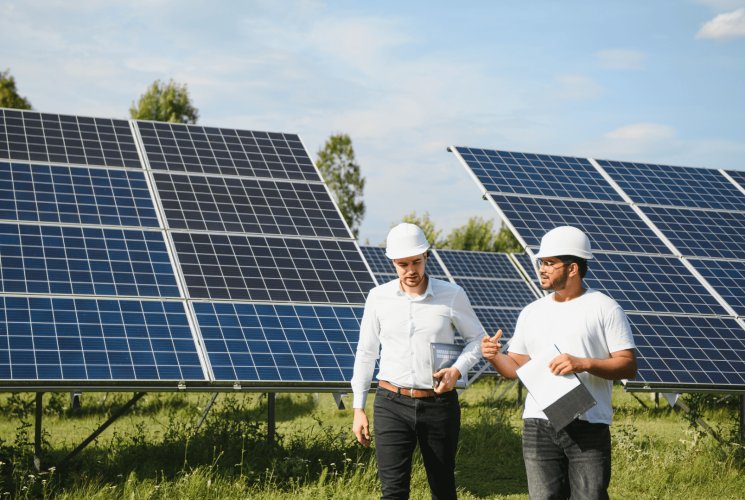Overcoming the Obstacles in the German Energy Storage Sector

Germany has become a leader in renewable energy, driving a national energy transition through the "Energiewende" policy. This commitment to sustainable energy has created a rapidly expanding market for energy storage, projected to grow at a significant rate. In this article, we explore the current challenges facing energy storage projects, the evolving business models, the legislative landscape, and the increasing trend of companies generating their own power.
Hybrid Projects: Combining Solar, Wind, and Storage
Hybrid projects that combine solar, wind, and energy storage are essential to meet Germany’s clean energy goals. These projects allow for consistent power supply by offsetting the intermittent nature of solar and wind energy. According to the German Energy Storage Association (BVES), the energy storage market grew by 46% in 2023, partly driven by these hybrid setups. Hybrid renewable projects that integrate solar, wind, and energy storage are pivotal for achieving energy resilience, but their implementation presents multifaceted challenges. Designing systems that harmonise the varying outputs of solar and wind energy with storage requires advanced technology and precise engineering. The economic hurdles include significant upfront investment and uncertain financial returns, particularly where energy markets or subsidies fluctuate. Regulatory frameworks, often tailored for standalone technologies, lag these innovations, complicating permitting and compliance processes. Grid compatibility adds another layer of difficulty, as hybrid projects can strain existing infrastructure or lead to inefficiencies if poorly integrated.
New Business Models in the German Renewable Energy Sector
As energy storage grows in importance, German renewable companies are exploring diversified business models that better integrate storage into their offerings. In 2022, Germany’s capacity of distributed energy systems including storage doubled to 12GWh, enabling companies to participate in the balancing market or offer ancillary services, according to data from Fraunhofer ISE.
Among the most promising models are:
- Battery storage-as-a-service: Companies can install storage at customer sites and offer flexible leasing options.
- Virtual Power Plants (VPPs): By combining decentralized energy resources with storage, companies can bid in the balancing market and meet demand fluctuations more effectively.
This shift to decentralised models emphasises the need for a workforce skilled in energy management software, distributed energy resources, and grid compliance, all critical for the successful operation of these new systems.
Navigating Germany’s Evolving Legislative Landscape
Germany's renewable energy sector is strongly influenced by regulatory frameworks, including the Renewable Energy Sources Act (EEG) and the National Hydrogen Strategy. In 2023, the German government updated the EEG to further support decentralised generation and storage, aiming to increase renewable energy’s share to 80% by 2030.
Yet, as the regulatory framework evolves, companies face challenges in adapting to complex compliance requirements. Permitting timelines remain an issue, with delays often slowing down project deployment. The German Battery Storage Association notes that permitting for large-scale storage projects can take up to 18 months; a delay that hampers both deployment speed and ROI for investors. Consequently, firms are looking for experts in policy and regulatory compliance to help streamline projects within the regulatory framework.
The Shift Toward Self-Generation: Companies Taking Energy into Their Own Hands
A notable trend in Germany is the move by companies toward self-generation, allowing them to cut dependency on grid providers, reduce costs, and advance their sustainability agendas. Self-generation is popular among commercial and industrial entities aiming to shield themselves from price volatility. With Germany’s energy costs averaging €0.3951 per kWh, the highest in Europe, self-generation combined with storage provides financial stability. More companies are also opting to participate in the European Union’s Renewable Energy Guarantees of Origin (REGO) scheme, through which they sell excess power back to the grid, creating a secondary revenue stream whilst providing clean energy.
This trend means companies need technical professionals skilled in storage system design and energy management platforms, as well as business development experts capable of building self-generation into profitable business models.
Recruitment Trends: The Skills in Demand for Germany’s Energy Transition
To navigate this evolving landscape, German renewable energy firms are seeking diverse, specialised talent across various domains:
- Project Managers with experience in hybrid storage-renewable integration are essential to ensure smooth project timelines and secure funding.
- Energy Analysts with an in-depth understanding of German energy policy can help optimize projects within the legislative framework.
- Software Engineers adept in virtual power plant platforms and distributed energy resource management will be key to expanding decentralized systems.
- Battery and Storage Specialists who can design and manage self-generation systems and balance market operations.
As the German energy storage market expands, recruiting the right talent becomes increasingly crucial. Our role as a recruitment firm is to connect renewable companies with professionals who can drive forward the energy transition, particularly in areas of storage and hybrid technology.
Looking Forward: Germany’s Energy Storage Future
Germany’s commitment to renewable energy storage is reshaping the energy landscape, from hybrid projects to decentralized self-generation. According to Bloomberg New Energy Finance, Europe will need to invest €1 trillion by 2030 to meet its energy transition goals, with Germany the leading contributors within the EU. While challenges remain, the opportunities for innovative business models, combined with a supportive regulatory environment, create a fertile ground for growth.
At the centre of this transition is the need for a skilled, agile workforce. We are excited to support Germany’s renewable companies in building the teams that will lead this journey, turning the vision of a sustainable energy future into reality.
If you have recruitment needs or challenges and would like to find out how Climate17 can support you, please don’t hesitate to reach out to me here. Looking forward to collaborating!
Recent news and views
How Storage Retrofits Are Changing Project Development
Discover how energy storage retrofits are reshaping renewable project development, from design and interconnection to revenue models, risk management, and long-term asset value.

How to Build A Development Team in the USA
Build a strong development team with the right skills, culture, and strategy. Learn how US renewable recruitment works and how to attract, hire, and retain top talent in a competitive market.

Sustainability in Transition: A Changing Market, a Crowded Talent Pool, and the Value of Specialist Recruitment
Over the past 12 months, the sustainability market has entered a new era. The job market surrounding it has become more complex, competitive and in many cases, challenging to navigate for both employers and candidates.

How Storage Retrofits Are Changing Project Development
Discover how energy storage retrofits are reshaping renewable project development, from design and interconnection to revenue models, risk management, and long-term asset value.

How to Build A Development Team in the USA
Build a strong development team with the right skills, culture, and strategy. Learn how US renewable recruitment works and how to attract, hire, and retain top talent in a competitive market.

Sustainability in Transition: A Changing Market, a Crowded Talent Pool, and the Value of Specialist Recruitment
Over the past 12 months, the sustainability market has entered a new era. The job market surrounding it has become more complex, competitive and in many cases, challenging to navigate for both employers and candidates.

Sign up to our newsletter
Jobs, insights, resources and more. A monthly update, straight to your inbox.





